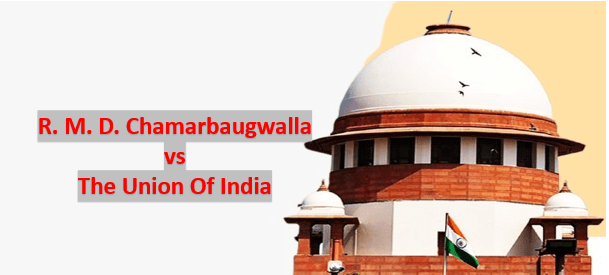
R. M. D. Chamarbaugwalla vs The Union Of India
| Citation | 1957 AIR 628, 1957 SCR 930 |
| Date of judgement | 09/04/1957 |
| Court | Supreme Court Of India |
| Case type | Writ Petition |
| Petitioner | R. M. D Chamarbaugwalla |
| Respondent | The Union of India |
| Bench | CJI Sudhi Ranjan Das, Bhuvaneshwar P. Sinha,P. B. Gajendragadkar,T. L. Venkatarama Iyer. |
| Referred | Article 19 (1),(6), Prize Competition Act,1955. |
FACTS OF THE CASE
The Petitioners challenged the constitutionality of the Prize Competition Act (42 of 955), Sections 4 and 5, and Rule 11 and 12 framed under Section 20 of the Act. The Petitioners are advertising and running prize tournaments in many states.
A ‘prize competition,’ as defined in Section 2 (d) of the Act, included not only gambling competitions but also those acts in which success depended to a significant degree on skill. Petitioners alleged that this section is violating their fundamental right given under article 19(6) of the constitution.
Petitioners have filed the present petitions under Art. 32 questioning the validity of some of the provisions of the Act and the rules framed thereunder.
The petitions were heard along with Civil Appeal No. 134 of 1956, wherein the validity of the Bombay Lotteries and Prize Competitions Control and Tax Act, 1948 was challenged on grounds of some of which are raised in the present petitions.
ISSUE RAISED
- Whether, in the definition of ‘prize competition’ in s.2 (d), the Act applies to competitions which involve substantial skill and are not like gambling?
- Whether section 4 and 5 of the Prize Competitions Act (42 of 955) violates the fundamental right under Article 19 (1) of the petitioners?
ARGUMENTS
The Petitioners argued that restrictions imposed by the state are unreasonable and violate their fundamental rights. Further, they also argued that Section 2(d) of the Prize Competition Act, 1955 was broad and covered all the competitions which are of a gambling nature and also those in which success depended to a substantial degree on skill. Other valid parts of this Act are also void as they are directly connected with invalid parts of the said Act.
The Respondents claimed that ‘prize competition’ as defined in s. 2(d) of the Act, properly constructed, means and includes only competitions in which success does not depend to any substantial degree on skill and gambling activities are not trade or business. Also even if some part of the Act is invalid then that should be removed but it does not mean that the entire Act is void. Additionally, they argued that the sale of lottery tickets which is gambling in nature cannot be given protection under Art. 19(1).
JUDGEMENT
The Supreme Court examined the provisions of the Act and evaluated the arguments submitted. It was held that the question of violation of the fundamental rights would not stand valid as gambling is not covered under the trade and hence no violation of the fundamental right. The purpose of The Prize Competition Act, 1955 is to control and regulate prize competitions and even if some parts like sections 4 and 5 would be invalid it does not mean that the entire act is invalid. After considering all aspects it was held that the doctrine of severability would apply here and the invalid provisions would be excluded from the Act and the valid part will be enforceable. The bench dismissed the petition.
Supreme Court about Severability
1)If the valid and invalid provisions of the law are directly related then the entire act will be invalid. We have to evaluate whether the invalid part can be separated from the valid part or not.
2)After differentiating both parts and if they are separate from each other the valid part will be reviewed and then only it will be upheld.
3)Even when the valid provisions are different from those which are invalid if they all form part of a single scheme which is intended to be operative as a whole, then the whole Act would be invalid.
4) To determine the legislative intent on the question of severability, it would be authorised to consider the history of the legislation, title, preamble and the purpose of it.
REFERENCES
https://main.sci.gov.in/judgments
written by Sharlika Chavan from ILS Law College, Pune. Intern at Legal Vidhiya.




0 Comments